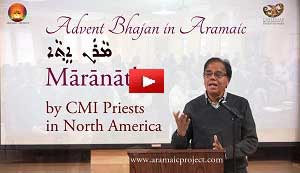
AP 310 to 301
MARANATHA Advent Bhajan in ARAMAIC at CMI North American Renewal Program
| Call Number | AP 302 |
| Part Number | Part I - Syro Malabar Church |
| Title | MARANATHA Advent Bhajan in ARAMAIC at CMI North American Renewal Program |
| Duration | 2:37 |
| Place of Recording | North American Renewal Program, New York |
| Date of Release | 22 November 2022 |
| Youtube URL | https://www.youtube.com/watch?v=sjyq5GhB3-g |
| Video Segment (s) |
|
Composition and Lead Singe : Joseph J. Palackal, CMI.
Special Thanks to : Rev. Fr. Sebastian Thekkedddath CMI.
Notes
Mārānāthā is a Greek form of the Aramaic phrase Maran Etha (Our Lord has come).
The Advent Prayer - Aadi Mantra of Aramaic Christians : Mārānāthā.
We are delighted to inaugurate this year’s Advent season with a musical version of the ancient Aramaic Christian mantra: Maranatha, in the form of a mini-Hindustani classical music concert. The text consists of a single phrase with two words: Maran Our Lord and Etha come. Depending on the word order, the phrase primarily means “Our Lord has come,” and secondarily, “Come, Lord [Jesus]”
The two meanings represent two different concerns at two stages in the life of the early Christians. The first concern was catechetical, to reiterate that our Lord has come; that Jesus of Nazareth is the Messiah they have been waiting for. Saint Paul uses the phrase ‘Maran etha’ (“our Lord has come”) in I Cor 16:22. As years went by, a new concern emerged due to the persecution of Christians by the Roman emperors. Now they wished for the return of the deliverer. Thus, the second coming of Jesus became part of a fervent prayer. We see this in the Book of Revelation, Tha marya iso, 22:20, which means “Come O Lord Jesus.” Both meanings of the phrase are relevant for the advent season. On the one hand, we look to the past when people waited for the Messiah, and then we look to the future waiting for the second coming of Christ. Also, the second meaning of the phrase matches with the apocalyptic phrase, “Come Lord Jesus,“ and as in the in the Lord’s Prayer, “Thy Kingdom come.”
More information from the historical, theological, and linguistic perspectives of Prof. Zacharias Thundy is available in our digital library under Maranatha and Zacharias Thundy.
The composer-performer in this video is a great artiste from Bangladesh, Dr. Prof. Krishnapada Mondal. We got acquainted with him in Aramaic Project-300. In this video, Dr. KrishnaPada Mondal incorporates another Mantra, Mar Walah that he performed earlier in Aramaic Project 300 (https://youtu.be/VH5KHDXKSa4). Maarantha can be considered an Aadimantra, a universal mantra for all Christians at all times and places. We hope this video will inspire many people to use this sacred Mantra to connect with the Christ experience of early Christians.
See also Aramaic Project-300 https://youtu.be/VH5KHDXKSa4
Dr. Joseph J. Palackal, CMI.
NewYork
1 December 2022
Keywords: #maranata #maranetha #AdventPrayer #AdiMantra #KrishanPadaMondal #Hindustani_Classical_Concert #hindustani #christianmusicology #christiandevotionalsonghindi #christianmusic #aramaic #SyriacChants #JosephPalackal



